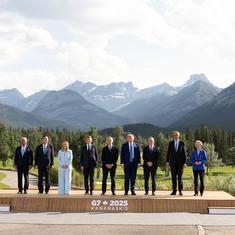Sri Lankan prime minister urges citizens to end protests against government
The island nation is facing its worst economic crisis since independence in 1948 due to shortage of foreign currency reserves.

Sri Lankan Prime Minister Mahinda Rajapaksa on Monday urged citizens in the country to end their protests against the government, reported PTI. The island nation is facing its worst economic crisis since its independence in 1948 due to shortage of foreign currency reserves.
In an address to the country, the prime minister, who is the elder brother of President Gotabaya Rajapaksa, said that the government is working round-the-clock to deal with the economic meltdown. He added that every minute people spend agitating on streets is depriving the country of inflow of foreign currency.
Since March, thousands of people have been protesting in the capital of Colombo and other cities against the government’s handling of the economic crisis.
Demonstrators had also marched towards the Presidential Secretariat on Saturday, shouting slogans calling for the president’s resignation. Some of them held placards calling the Rajapaksa family “thieves” and asking them to “go home”.
The Rajapaksa family has dominated Sri Lankan politics for two decades. Gotabaya Rajapaksa and Mahinda Rajapaksa are third-generation politicians.
Last week, Sri Lanka’s entire Cabinet, except Gotabaya Rajapaksa and Mahinda Rajapaksa, had resigned en masse from their positions. A new finance minister was appointed, but he too resigned less than 24 hours after he accepted the post.
In his address on Monday, the first since nationwide protests began, Mahinda Rajapaksa blamed the coronavirus pandemic for the economic crisis, reported NDTV.
“We are facing this crisis, right after being faced with the [Covid-19] pandemic,” he said. “Despite knowing the country’s economy going down, we had to impose a lockdown and that’s why our foreign reserves depleted.”
He added that protestors were demanding to send home the entire 225 parliamentarians. This, he added, is a dangerous demand.
Also read:
Sri Lanka: Tracing the historic roots of the island’s economic crisis
Economic crisis in Sri Lanka
The island nation of 22 million people is mired in public debt. With the country’s foreign currency reserves declining, Sri Lankans are facing shortages of medicines, milk powder, cooking gas, kerosene and other essential items.
The government had said it is seeking a bailout from the International Monetary Fund and have sought help from India and China.
Authorities have imposed 13-hour daily power cuts due to shortage of fuel to operate power plants.
Hundreds of bakeries in the country have shut down because of lack of cooking gas. Several state-run hospitals have stopped conducting surgeries.
The government has also indefinitely postponed school examinations for Classes 9, 10 and 11 because it does not have stocks on which to print question papers.









